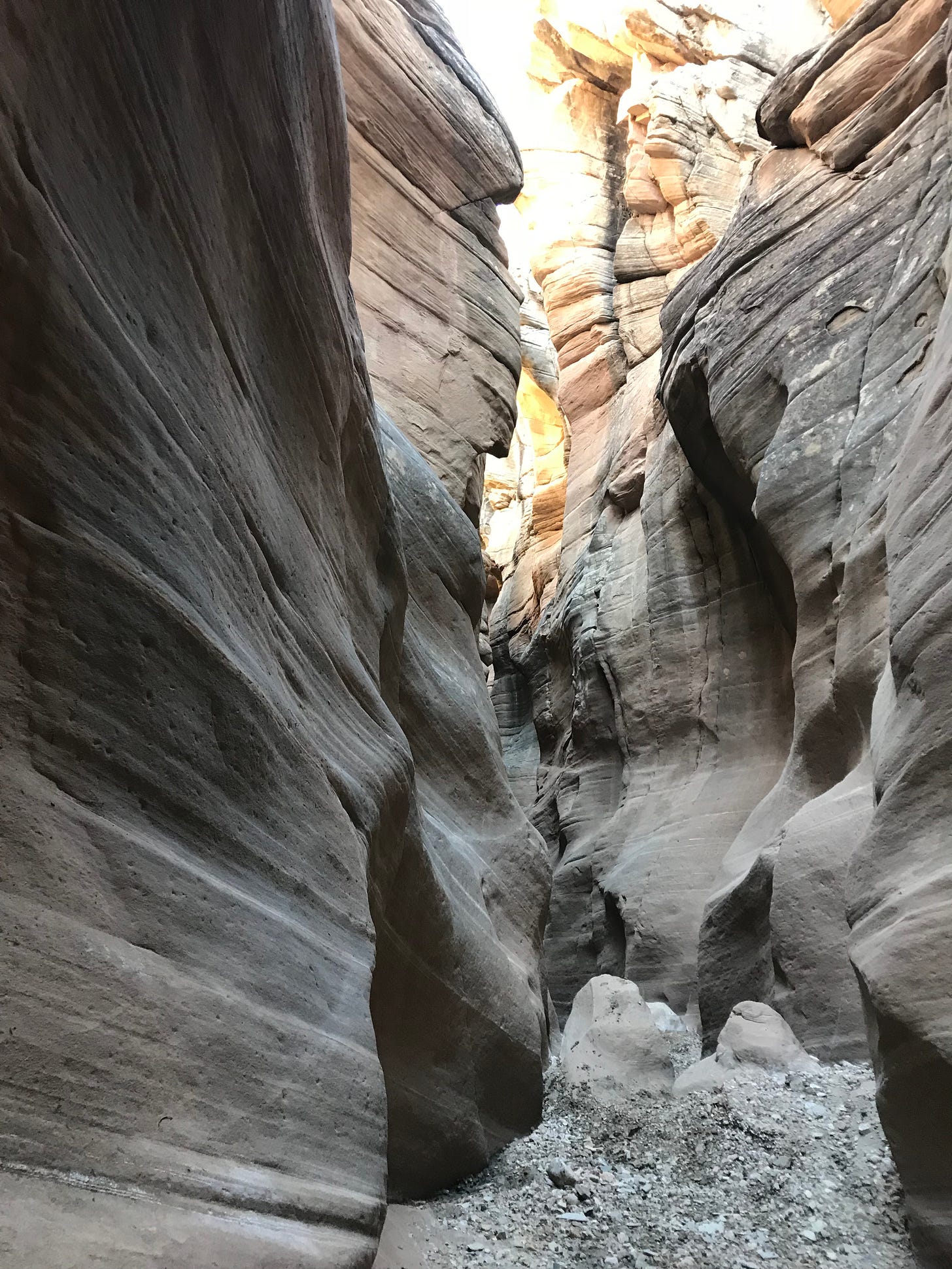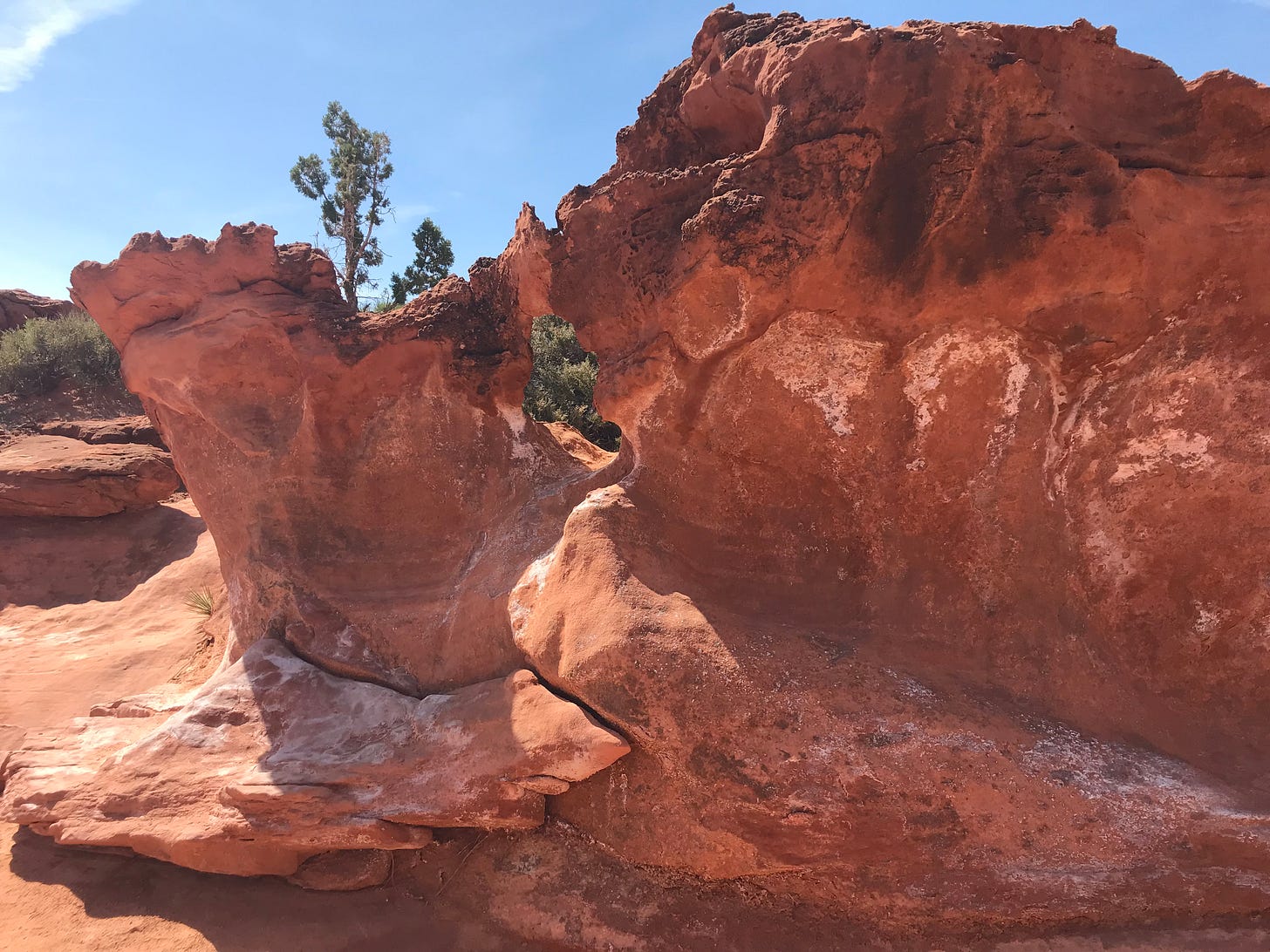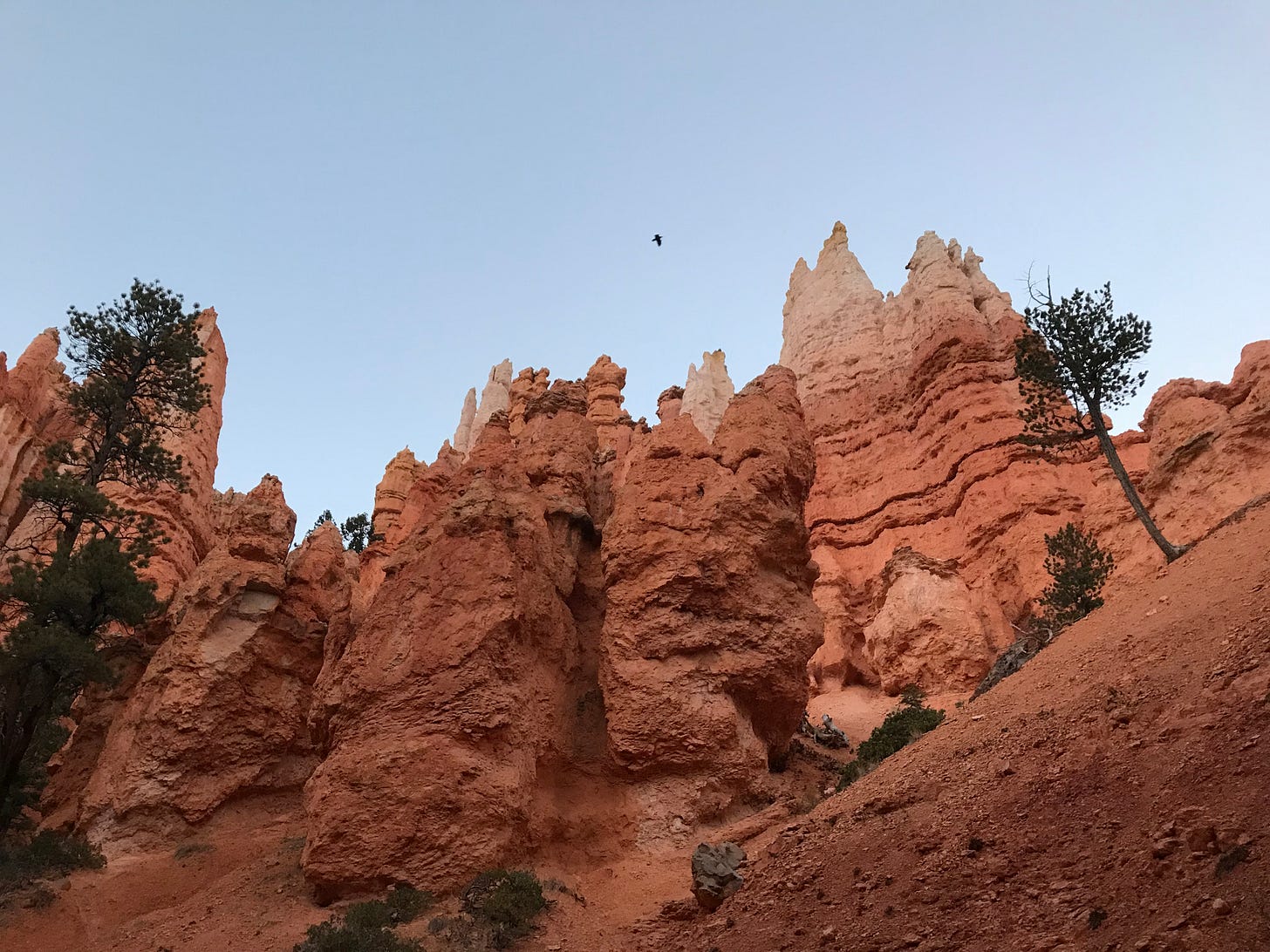Hello, all. Welcome, new subscribers. I am in awe of the gift of your attention. Thank you.
To be stuck, for as far back as I can remember, has been my greatest fear.
Wild geese meander into the fat, murky river I walk alongside. For a moment, they float toward me. And though I can’t see below the surface, I know their legs are churning beneath still bodies. Then in a stream of light and current, they pass me by.
Every decision I’ve made, be it career or relational, to stay or to go, to save or to spend, has been in the name of freedom, mine or theirs, which is, for me, movement, which is, for me, love. For this, I’ve chastised and cheered myself in equal measure. “Stop running away.” “Keep going!”
Western Oregon, USA, November 2024. Zoom in to see how swift the current really is.
Once, I lay in the rust green hull of a tin canoe. I’d borrowed the boat from a hostel in northern Vermont. Fall had blown its cold breath into the trees, setting them ablaze. When I woke, the gentle rocking I’d drifted off to had become frenetic. Lead clouds had replaced dappled light. I’d only just spotted the distant shore (the one I’d left, I was pretty sure), only just dipped an oar into the corrugated folds beneath me, when the first drops of cold rain hit my skin.
The desert is on my mind these days: I’m often there this time of year. I’m in one. We’re in one. No, not geographically speaking.
I no longer know how many autumns and springs I’ve traversed waterless land molded by water and wind. I wedge my body into a narrow shoot created by a break in a rock wall and pick my way down before dropping to a sandy floor. To descend into the belly of the earth and make your way back up is to time travel. I pass limestone walls that, a mere 270 million years earlier, were shallow seabed. (Yes, I mean “mere”; these lands are babes compared to those across oceans I’ve yet to walk.)
The dark chocolate layer just a bit higher—sandstone, siltstone, and mudstone—was formed 30 million years later when the landscape shifted to lazy rivers. I climb over driftwood come stone, petrified by minerals, sometimes in the exact shapes they’d had when they lay on ancient floodplains.
A reader, now dear friend, sent a message by snail mail. “I see a link between your body and our country,” she wrote. I think of the way an autoimmune disease mistargets. I think of the suddenness of its arrival and how there will be a before and an after. I think of all the clues I might have missed building up for years, how it’s hard to say if this or that played a role, was a sign, and of how something in my genes, in my very foundation, lay waiting to be triggered. I think of how vigilance and protection is a must—so that after will be beautiful too. I think of the role hope plays, that and the relentless “no” that must be said to anything that doesn’t help. I think of how much my friend’s words, her attention, her voice—and yours—do.
The next layer up is vermillion. If you close your eyes, you can see them, can’t you? Those scarlet cliffs? How they blush like new lovers when dawn spills its lace across them? How they brood like embers of a night? Now keep your eyes closed and look back further. Can you see how they were sand and iron oxide barrelling through waters that had gone from lazy to roaring? How they clung here as deposits, there to form banks where dinosaurs meandered?
A couple years back, my two canyoneering partners and I strapped packs to our backs and hiked the Escalante, Utah, portion of the 15-mile Boulder Mail Trail, before climbing down into a river called Death Hollow and plodding through its waters. Up and up, we marched. We passed the layer of red and trekked another 20 million years to the next—then white sand dunes whipping over waters, now vanilla-colored rock known as Navajo Sandstone.
We sat close in the short shade of a juniper to eat nuts and dried meat and fruit. We noted the remnants of the old telegraph line we kept seeing. We stood and sucked down our water bladders and continued up—up toward the gray cliffs, mudstone and shale once sandwiched between river and sea. Our conversation thinned, like the vegetation, like the air, like the veil between us and the bliss of only existing.
An occasional, “It’s wild to think about,” would slip between us. We meant the mail carriers, who’d made this trek with heavy packs and loaded donkeys, in temperatures both freezing and soaring. We meant the facts of our aliveness and the landscape’s aliveness. We meant the gorgeous ephemerality and minuteness of us.

In the tin canoe in Vermont, I plunged my oar deep and thrust the water behind me. I was drenched in minutes. The iciness of the rain and dropping temperature mixed with the heat of my effort. I kept my sight on the shore. For a long time, I was pretty sure it was getting neither closer nor farther.
“If you allow yourself to imagine never running free through the world again, do you feel like you are being crushed?” my friend wrote. “Or does your beautiful spirit only live in hope and optimism?”
Here’s the thing. If the region we humans call the Colorado Plateau hadn’t tilted toward the shifting of tectonic plates, we would only be able to see the top layer—only 20 million years back. We’d see the Claron Formation, pink limestone spires and knobs and hoodoos, and think that was it. But the plateau went askew. And the area we call Utah shot thousands of feet up. And the rivers’ gradients steepened. And water went wild. And wind joined in. They carved. They bit into soft rocks till they crumbled into rippling slopes. They worked and worked at the harder rocks, pressing them into massive cliffs, whittling them into deep, winding canyons. Which is to answer, yes, yes.
We reached the ridgeline above Death Hollow, we three canyoneerers, and observed the ribbon of river below. Wind had dried layers of sweat into crusty salt on our skin. The water beckoned. My companions hurried down the sheer cliff. I watched them grow smaller. I took a deep breath and followed.
When my tin boat’s nose hit the clay shore at last, I plunged out into the silty bed, nearly tipping the boat. I grabbed its stubby rope and tugged it just out of reach of the water’s tongue. Then I fell onto the bank, slick with thick grasses pasted to clay soil by the storm, and hooted my delight.
On today’s walk, the geese take flight. I stand next to naked tree limbs tipped white with frost and throw my head back to watch. I wonder, is this it? Will this be the time they don’t touch back down but, instead, move toward their southern winter destination, not to return until spring tempts them back for a stopoff on the way to arctic breeding grounds?
How human is it to forget that we are wind, we are water, we are sediment? To fear the one thing that is an absolute impossibility?
Now you. When you think of the future, are you crushed? Does hope guide you? When changes you don’t want come to mold you, how do you respond? What do you think about how the way you move through the world shapes it?
Your attention, your words, your voices mold me and my writing. I send this your way with a wave of gratitude. Please send the wave forward with a share or a restack if sharing it calls you.
Up next? Among much else, an interview with a through hiker on entering the forest and coming out changed for life, a collaboration with two women from far-flung parts (South Africa and the Shetland Islands), a series of tributes to Ruby the van to help me think about letting her go in favor of a newer rolling home, and a new offering for the new year.
Help it all find its shapes. And don’t miss any of it:









Beautiful photos, beautiful prose. I don't feel crushed; challenged, yes, but crushed, rarely. I bend like the willow to change and am thankful that after 6+ decades, the wisdom of how to do that has taken root. It's definitely not easy, but I've learned from my husband that projecting what might be or happen, does me no good, as I'm not in that future moment, I'm in the present. In the present, I can handle the present. The video of the current and ducks is amazing, btw. Thanks for a great post.
Stunning all the way through, Holly. This made me want to be out there.